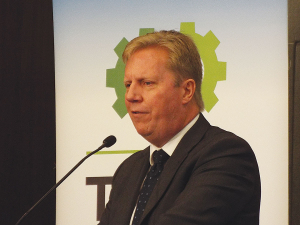First up to the podium at the recent Tractor and Machinery Association (TAMA) Conference in Wellington, Minster for Agriculture, Todd McClay, reflected on a difficult 12 months, but hinted at signs that things were turning the corner, saying “when ag does well, New Zealand does well”.
With 80% of the goods being exported traceable to rural NZ, McClay accepted that “things have been challenging”, not least with a myriad of rules and regulations handed out to rural folk during the six-year tenure of the previous government, which in many cases did not focus on outcomes.
He said that in a sector that employed in excess of 350,000 people, poorly thought-out rules and regulations drove up costs. But he was pleased to convey that his Government’s primary sector focus was to ask to simple questions: “Is it necessary, yes or no, and is it cost effective, yes or no?”
Since taking office, the new coalition has repealed or amended twenty rules and regulations, the largest being He Waka Eke Noa and the removal of agriculture from the Emissions Trading Scheme.
While spending time listening to agricultural leaders and farmers, the Minister suggested that NZ agriculture still needs to keep a close eye on environmental matters, because overseas consumers were increasingly demanding better quality, traceability and a genuine commitment to environmental obligations.
“However, those solutions do not need to be the most expensive, but they do need to be effective,” says McClay. “Of course, there will be farmers in some areas that might need a little attention and some friendly advice, but I would suggest that more of the carrot and a little less stick will get to the required result a lot quicker.”
Coming away from Fieldays in June – his first as Minister for Agriculture – McClay noted an increase in optimism and a collective relief that the unending avalanche of red tape had stopped appearing in the mailbox.
McClay mentioned the “doubling up” of Farm Plans by local government: “There can be absolutely no need for consultants and huge council fees to achieve worthwhile farm plans. Why indeed does local government even need to be involved, when the likes of Fonterra and other farming companies are working with their shareholders to bring a plan together, usually with a far greater understanding of the industry”.
In closing, he accepted times are tough but noted that there are signs of light at the end of the tunnel with interest rates falling, milk and beef prices rising and the days lengthening as we move into spring.


















